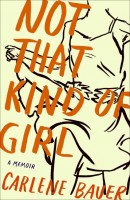 Today marks the publication of Not That Kind of Girl
Today marks the publication of Not That Kind of Girl, a memoir by Second Pass contributor Carlene Bauer. In it, she details her evangelical upbringing in southern New Jersey, her move away from the church in her 20s, her embrace of secular saints like Liz Phair, the Smiths and Sylvia Plath (among others), her late blooming, her brief conversion to Catholicism and her continuing struggle to reconcile her spiritual and worldly sides. She does all of this with humor and lovely prose.
Walter Kirn praised the book, writing, in part: “[Bauer] seems to lose her bearings at times, then find them again, then lose them once more. Her blessed center can’t seem to hold. What does hold, sentence by sentence and page by page, is Bauer’s sure grip on our sympathies. Her style is light but not trivial — the laughs she wrings from her moral dilemmas are shaded with melancholy longing.”
An excerpt from Not That Kind of Girl:
It wasn’t that I wanted to stop being a Christian. Peace had been promised to us, so I couldn’t give up. As Paul had told the Philippians: work out your own salvation. I had to keep on believing that there were more things in heaven and earth than were dreamt of by area congregations, and that I would one day find a congregation that believed this along with me.
Until then, my teenage soul — suspicious of cheerfulness, though still reflexively respectful of authority — would feel increasingly uncomfortable in the presence of the official soul. The official soul, as transmitted through church and Christian paraphernalia, was upbeat, incurious, happy with its lot. It did not have any heroes other than the ones who appeared in the Bible, and it was content to hear the same stories about these people over and over again. It described pain and suffering in such a way that a person might think alcoholism or the loss of a child were no more inconvenient than a tussle with the flu: after it passed, you could stand in front of the congregation on Sunday and testify that it was all better, and God was good. As far as I could tell, that was the only story told by the official soul, and the real and true sadnesses had been excised for a more mellifluous account. Which made it seem as if there were things you couldn’t talk about in church, or with people from church — what made you laugh, why you cried at a movie, what made you angry, or what books you read that hadn’t been written by C. S. Lewis, A. W. Tozer, or D. L. Moody. Church was supposed to be the most important thing in life, but so much of life was left out, because so much of its trouble was assumed to be conquered. My pastor mentioned Kierkegaard in a sermon only once, and it would be a long time before I discovered that there was a storied Christian who suffered from, and so in some way sanctioned, depression, rage, sarcasm, and despair — the diseases that took hold in adolescence, for which church offered no cure.

